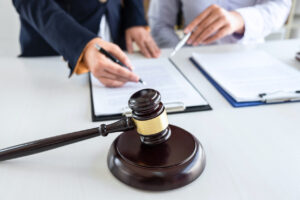
Georgia is an at-fault state for car accidents and other personal injury claims. If someone causes you to be injured, that person may be financially liable for your damages. However, before you can recover damages for a personal injury case, you have the burden of proving the legal elements required to establish liability.
What Is the Burden of Proof in a Georgia Personal Injury Case?

The burden of proof is your responsibility to present sufficient evidence to support your claim. There are several levels of proof. For example, the burden of proof in a criminal case is beyond a reasonable doubt.
However, the burden of proof for a personal injury case is lower. You only need to prove your case by a preponderance of the evidence to win.
What Do We Mean by Preponderance of the Evidence?
The preponderance of the evidence is a legal term used to describe the level of proof you need to establish your claim. The injured individual in a personal injury case has to prove that it is more likely than not the facts of the case establish the elements required to establish liability. In other words, there is more than a 50% chance that the defendant (the at-fault party) caused your injuries.
Most personal injury claims are based on negligence. Therefore, if you are trying to prove negligence, you would need to prove by a preponderance of the evidence:
Legal Duty
A duty is a responsibility to act with a certain standard of care. The defendant must have owed you a legal duty of care. For example, a driver has a legal duty of care to obey Georgia traffic laws and use reasonable care when operating a motor vehicle.
Breach of Duty
A person breaches their duty of care when their actions fall short of the required standard of care. The standard of care is based on what a reasonable person would do under the circumstances.
For example, a driver may be guilty of breach of duty if they run a red light, drive while intoxicated, or speed through a school zone.
Causation
Causation is the reason why something happens. You must prove that the defendant’s conduct directly and proximately caused your injuries. Continuing with our example above, you must prove that had the driver not run the red light, you would not have been injured.
Damages
The last element is to prove that the defendant’s breach of duty caused you harm or damages. In a personal injury case, you can receive economic damages for your financial losses, such as out-of-pocket expenses, lost wages, property damage, and medical bills.
You can also recover non-economic damages for your pain and suffering. These damages include emotional distress, diminished quality of life, impairments, and mental anguish.
What Evidence Do I Need To Meet the Burden of Proof in a Lawrenceville Personal Injury Case?
The evidence used to prove your case depends on the facts of your case and the type of personal injury case. However, common types of evidence used to prove the above elements of a personal injury case include:
Witness Testimony
Witnesses testify about the issues in dispute. Testimony may include how the accident occurred, who caused the accident, and the injuries and damages sustained by the parties. Because the parties dispute who is liable for causing the accident, their testimony is usually contradictory.
Therefore, eyewitness testimony can be invaluable in a personal injury case. Eyewitnesses saw how the accident occurred or had other direct knowledge relevant to the case. They do not have a stake in the case’s outcome, so jurors may give eyewitness testimony more weight.
Photos and Videos
A video of the accident as it occurred and photos of the accident scene are often used as evidence in personal injury cases. They provide a visual accounting of what occurred, which can establish who is at fault for causing the accident.
Medical Records
It is essential to seek prompt medical treatment after an accident or injury. Documenting your injuries right after the accident helps prove that the accident caused the injuries. Medical records are vital evidence in a personal injury case because they prove the type and extent of your injuries.
Expert Testimony
Expert witnesses have specialized knowledge of a specific subject that helps jurors and judges understand complicated matters. Experts are often used in medical malpractice, product liability, and accident cases.
The types of experts used in your case depend on the facts. However, your attorney may hire accident reconstructionists, medical specialists, safety experts, financial professionals, and engineers to assist in building a strong case for liability.
Clear and Convincing Evidence in a Personal Injury Case
If you seek punitive damages, the level of proof increases to clear and convincing evidence. Punitive damages are awarded to punish the defendant for egregious conduct. Therefore, the evidence must show that it is highly and substantially more likely than not the defendant’s conduct was intentional, malicious, fraudulent, or lacked any care for the consequences.
Set Up a Free Consultation With an Experienced Lawrenceville Personal Injury Attorney
Proving liability for a personal injury claim can be challenging. If you are unsure what to do after an accident or personal injury, you can discuss your case with a Lawrenceville personal injury lawyer at Lawson Personal Injury Attorneys during a free consultation. Gives a call today at 678-446-3655.
